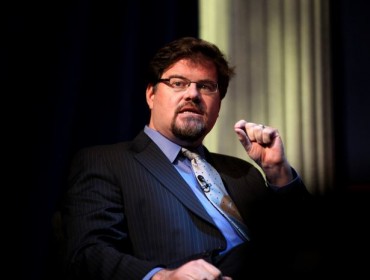
As a conservative student, have you ever wondered why fighting intellectual battles on campus is like banging your head against a wall? No one wants to debate the merits, just call you a bunch of names.
Right-winger. Fascist. Extremist. Hate-monger.
It’s important to understand how and why you get shut down with ad hominem attacks every time you attempt to defend your beliefs, because it’s the first step toward equipping yourself with the proper debate tools to successfully battle your campus antagonists.
One of the brightest minds to offer such understanding is bestselling author and nationally syndicated columnist Jonah Goldberg, a contributing editor to National Review and the founding editor of National Review Online whose two New York Times bestsellers, “The Tyranny of Clichés” and “Liberal Fascism,” frequently delve into the rot eating away at the soul of American universities.
Goldberg, who often gives speeches on college campuses, is lauded for his ability to bridge media savvy conservatism with academic scholarship to unmask much of the idols of statist politics in America.
America.
In this exclusive Q&A with The College Fix, Goldberg explains how American progressivism was born of the same intellectual and political climate that gave rise to various European collectivist, statist and nationalistic movements – and how those mindsets are currently in control of higher education discourse today.
What’s more – with advice such as “nothing pisses off the left more than a conservative who’s enjoying himself,” “be careful not to internalize the left’s terms,” and “conservatives need to get better at convincing people that we believe what we believe not just because it is good for us but because it’s good for everybody” – Goldberg offers numerous tips to students on how to fight the good fight on campus.
Important advice, because what you are up against is nothing less than those who would control everything you think, say and do.
“Political correctness, speech codes, hate-crime hoaxes: these are all efforts by a very small number of people to control what is said and how it is said,” Goldberg explains. “I don’t think any women’s studies professors are looking to Mussolini or Georges Sorel for inspiration. But what they are doing is trying to manufacture crises that give them more authority and power.”
While you rightly point out that the word “fascist” is exhausted in its use, do you think the fascist connections with American progressivism carry on in any of the clichés (i.e. those buzz phrases that stop an argument) you find when you speak at different campuses?
Goldberg: A big point of my book was an attempt to “deflate” the idea of fascism. It wasn’t an outlier in the earlier 20th century; it was a very mainstream movement (particularly before the rise of Nazism) that was part of the fad for “experimental” social engineers. The key issue is power.
Today, the power of fascism is in using the label to silence your opponents. No one gets called a fascist for wanting more “public-private partnerships” between the feds and big business, even though that sort of thing is central to fascist economics. No, people get called “fascist” for disagreeing with feminist radicals or supporting free speech or refusing to conform. The most fascistic things routinely said on college campuses today is “if you’re not part of the solution you’re part of the problem” or “the time for debate is over.”
There’s no safe-harbor for disagreement. You have to get with the program or you’re a “problem” that needs to be fixed. The best working definition of fascist for the left is simply a “conservative who’s winning an argument.” Because all you have to do to get called a fascist is to disagree with a leftist. Rightwing on college campuses is just another word for “non-compliant.”
Orwell noticed this a long time ago, which is why he said that fascism had simply come to mean “anything not desirable” or something like that.
You write in your latest book, The Tyranny of Clichés, that clichés are tyrannical in that they are “the use of allegedly non-ideological insights to advance starkly ideological understandings of the world.” Is academic freedom now a tyrannical cliché, and how so?
Goldberg: Sure. Let’s start with the word ideology. Few words have a worse reputation these days. It has become synonymous with “closed-minded” and “dogmatic,” even “brainwashed.” This is nonsense. An ideology is merely a checklist of your principles. Hopefully your principles are derived from empiricism and experience, though they needn’t always be. (I have never murdered anyone, never committed incest etc., yet I am ideologically, even dogmatically, opposed to them.)
There’s nothing wrong with being ideological or dogmatic. When people tell me they hate dogma or certainty and brag about how open-minded they are, I tell them that I am dogmatically opposed to setting orphanages on fire. I am also dogmatically opposed to slavery, genocide and the consumption of flan. Save for that last bit, does that make me more or less enlightened?
Again, it all comes back to power. The Progressives borrowed this neat trick from Napoleon and Marx (which sounds like a fine haberdashery). They unilaterally declared all competing ideologies to be closed-mindedly “ideological” while claiming for themselves an open-minded pragmatism. So liberalism doesn’t have to defend itself as an ideology while it can accuse all of its competing ideologies of being cult-like and other-worldly. We hear this in Obama all of the time. His opponents are “ideologues” who put their “ideology” ahead of the American people, while he is merely a “problem-solver” who only wants to do “what works.” I’m sure he believes it.
Which points to one of the big problems with liberalism; its staggering lack of self-awareness.
Liberals simply take it as a given that they are open-minded, morally superior free thinkers. At least conservatives acknowledge our dogma. Liberals have become so dogmatic they can’t even see theirs.
Are there other ways you find the tyranny of clichés functioning in the university today, as in what are the biggest ones you find when you visit a college?
Goldberg: My single biggest complaint about the majority of college campuses is the widespread myth that being liberal is rebellious somehow. I always like to ask students something like: “So, let me get this straight. Your professors are liberal. The administration here is liberal. Your high school teachers were liberal. The mainstream media is liberal. The music industry is liberal. Hollywood is liberal. The art community is liberal. The fashion and publishing industries are liberal. And yet you people think you’re sticking it to the Man by agreeing with them?”
Being liberal is just about the least rebellious thing you can do on an elite college campus. At least libertarians rebel against bad economics and speech codes. But if you really want to break with the herd at an Ivy League school, do something unpredictable: be a Christian conservative.
Can young students take the clichés at the university and redefine them to suit their own picture of politics?
Goldberg: I’m sure they can. That’s standard operating procedure in politics. My only caution is that when you turn the tables on your opponents you should be careful not to internalize the left’s terms. You don’t fight a double standard by accepting your opponent’s standard.
For instance, take diversity (which I write about a lot in Tyranny of Clichés). Diversity can be bad or good, it all depends on what you’re diversifying and how you’re doing it.
At some campuses I’ve been to, conservatives have successfully gotten student activity money by appealing to the “diversity fund” or whatever they call it. That’s great. Intellectual diversity can be more important than many of the kinds of diversity celebrated on college campuses. But there’s a real danger of being coopted by that kind of arrangement as well.
You recount in The Tyranny of Clichés the legend that William F. Buckley Jr. once told George Will in the 1970s how to write two columns in a week: “At least two things a week will annoy you, and you’ll write about them.” Conservative writers easily find more than two things a week at college to annoy them. But being annoyed is not sufficient. One has to be funny and have a point with ridicule. What is the best tactic to make sure one’s ridicule invites possibly sympathetic readers rather than pushes them away?
Goldberg: I don’t know that that is true. Don’t get me wrong, ridicule is great for the things ridicule is great at, and I often pay my mortgage with the proceeds from ridicule. But it’s also really important to show concern and compassion. Conservatives are great at ridicule, largely because liberals make such easy targets of themselves. But liberals have an advantage when it comes to convincing people their hearts are in the right place. Their ideas are often stupid, but you know what they care about.
Conservatives need to get better at convincing people that we believe what we believe not just because it is good for us but because it’s good for everybody. Capitalism is the greatest anti-poverty program in human history. Yet conservatives rarely emphasize that. Why?
More to the point of your question, the ultimate goal must never be ridicule but persuasion. If you find that mocking your opponents isn’t winning readers over maybe you should try a different approach. When I debate someone on campus, the goal is never to persuade my opponent, at least not on the Big Questions. It’s too persuade the audience. I believe in entertaining the reader – in fact I believe in it more than most, I think – but the question you need to ask yourself when contemplating ridicule is, “Is what I’m writing more or less persuasive with this zinger?”
Also in The Tyranny of Clichés, you mention how the “grotesque higher education price ‘bubble’ inflated over the last generation” due to policies inspired by the liberal dogma “that everyone should go to college.” Your book tries to unmask such dogmas. But how can a young conservative try to play the happy warrior when these dogmas affect them directly?
Goldberg: First of all don’t play a happy warrior, be a happy warrior. Though, I guess if you have to fake it, you still should. Nothing pisses off the left more than a conservative who’s enjoying himself. Also, people are more likely to be persuaded by someone who isn’t bitter and cranky all the time. Nobody wants to listen to someone in dire need of an enema.
Moreover, the reason I am a conservative is that conservatism – like libertarianism – is only a partial philosophy of life. If you make politics your everything then you will ultimately be unhappy because that’s how politics – and life – works.
On a more nonpolitical note, you recently wrote that integrity was not traditionally defined “simply by doing the right thing, but by wanting to do the right thing.” Yet now integrity is seen as “a commitment to self-made principles” rather than consistency of virtue. How can college students avoid the new type of integrity and maintain the old when self-serving clichés are so ubiquitous?
Goldberg: That’s a great question. My short answer is: I don’t know. I am an unlikely candidate to lead a moral revival. But it seems to me one good first step would be to take a serious inventory of yourself. Are you following a principle of right and wrong or have you fabricated a principle to rationalize what you want to do. We humans are very good at lying to ourselves.
But I think deep down we can figure out when we take a position out of convenience rather than morally-informed reason. One way to start that process is to ask yourself, “When was the last time I made a moral decision that was really inconvenient to what I wanted to do?”
Goldberg is set to appear Feb. 12 at the University of Michigan’s Rackham Amphitheater through Young Americans for Freedom.
College Fix contributor Ryan Shinkel is a student at the University of Michigan.
Like The College Fix on Facebook / Follow us on Twitter
IMAGES: Main, Brad/Flickr; Inside – Gage Skidmore/Flickr





Please join the conversation about our stories on Facebook, Twitter, Instagram, Reddit, MeWe, Rumble, Gab, Minds and Gettr.